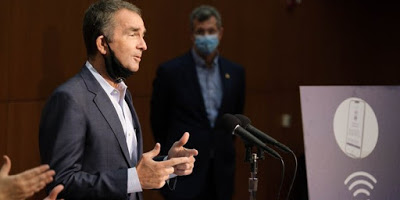New Virginia laws address police reform
 |
| Gov. Northam [Ned Oliver/Virginia Mercury] |
Virginia Gov. Ralph Northam signed a series of laws on police and justice reform that were approved during the General Assembly’s special session.
The measures were generally driven by the death of George Floyd at the hands of Minneapolis police this summer.
The omnibus policing reform legislation (Senate Bill 5030) incorporates the following bills:
No-knock warrants – Law enforcement officers are prohibited from seeking or executing a no-knock search warrant, like the warrant that led to the death of Breonna Taylor in Louisville, Ky. (SB 5099).
Neck restraints – Law enforcement officers can use neck restraints only in limited circumstances (House Bill 5069).
Excessive force – Law enforcement officers must intervene when they witness another officer engaging or attempting to engage in the use of excessive force (HB 5029).
Military gear – Police can no longer obtain or use military equipment, such as grenades, weaponized aircraft, and high-caliber firearms (HB 5049). Northam amended the bill to clarify that law enforcement agencies can seek a waiver to use restricted equipment for search and rescue missions.
Police training – Minimum training standards are required for law enforcement officers, including training on awareness of racism, the potential for biased profiling, and de-escalation techniques (HB 5109).
Background checks – Law enforcement agencies and jails must request the prior employment and disciplinary history of new hires (HB 5104).
Social justice – The Criminal Justice Services Board is expanded and diversified to ensure that the perspectives of social justice leaders, people of color, and mental health providers are represented (HB 5108).
Decertification – The process for decertifying law enforcement officers is strengthened and the Criminal Justice Services Board can now initiate decertification proceedings (HB 5051).
Inappropriate relationships – It’s now a Class 6 felony for law enforcement officers to “carnally know” someone they have arrested or detained, an inmate, parolee, probationer, pretrial defendant, or post-trial offender if the officer is in a position of authority over such individual (HB 5045).
Other police reform/criminal justice bills signed by Northam:
Civilian review boards – Localities are empowered to create civilian law enforcement review boards with the authority to issue subpoenas and make binding disciplinary decisions (HB 5055 and SB 5035).
Crisis intervention – Law enforcement officers must complete minimum crisis intervention training that meets certain standards (SB 5014).
Related story: New Virginia laws affect firearms, immigrants, workers, marijuana, much more
Correctional facilities – Virginia can enforce standards at detention centers used by U.S. Immigration and Customs Enforcement (ICE), as well as other local correctional facilities (SB 5017).
False reports – The penalty is increased for falsely summoning or giving false reports to law enforcement officers due to an individual’s race, religious conviction, gender, disability, gender identity, sexual orientation, color, or national origin (HB 5098).
Pattern or practice – The attorney general can open investigations related to a suspected “pattern or practice” of misconduct among law enforcement officers (HB 5072 and SB 5024).
“Too many families, in Virginia and across our nation, live in fear of being hurt or killed by police,” Northam said Oct. 28. “These new laws represent a tremendous step forward in rebuilding trust between law enforcement and the communities they serve.”
Northam also signed the following bills addressing COVID-19 and other issues:
Executive orders – A violation of an executive order declared by the governor during an emergency is punishable as a civil penalty of not more than $500 or as a Class 1 misdemeanor. A law enforcement officer can issue a summons for a violation (HB 5093 and SB 5177).
COVID civil liability – Hospices, assisted living facilities, and private providers that treat COVID-19 patients are not liable for wrongful death (HB 5059).
Nursing home visitors – Certified nursing facilities, nursing homes, and hospices must establish a protocol to allow each patient to receive visits during a public health emergency related to COVID-19 (SB 5041).
Disease data – The Department of Health must make available to the public certain data on communicable disease outbreaks (HB 5048).
Price gouging – Selling or distributing necessary goods by a manufacturer or distributor at an unconscionable price during an emergency is prohibited (HB 5047).
PPE – The governor is given the authority to purchase and distribute personal protective equipment during a public health threat (SB 5039).
Unemployment benefits – The Virginia Employment Commission can extend short-term unemployment compensation (HB 5087).
Evictions – Anti-eviction protections are expanded for people who experienced the loss of wages due to COVID (HB 5115).
School plans – School boards must publicly post their strategies for mitigating the spread of COVID-19 before reopening schools (SB 5083).
Telemedicine – Medicaid coverage is expanded to include telemedicine (HB 5046 and SB 5080).
Juneteenth – June 19, also known as Juneteenth, is a legal holiday commemorating the abolition of slavery in Texas, the last state to do so (HB 5052).
Absentee ballots – $2 million is appropriated to the Department of Elections to provide prepaid postage for the return of absentee ballots for the Nov. 3, 2020, election (SB 5120).


